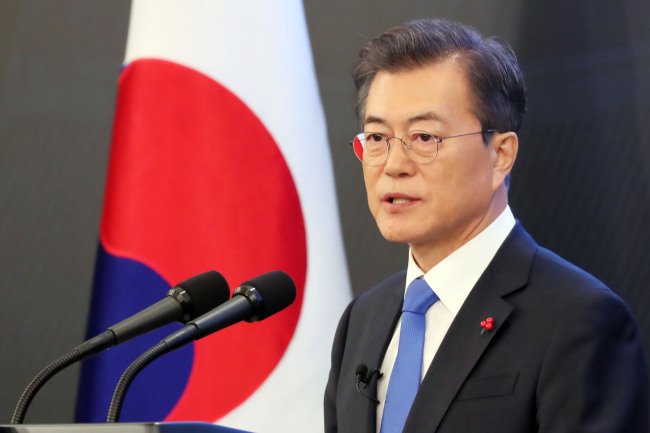President Moon Jae-in reiterated Wednesday his pledge to hold a referendum on constitutional amendment in tandem with the upcoming local election in June, urging the National Assembly to come up with an agreed revision bill by March.
In the New Year’s press conference at the Blue House, Moon also said the government is willing to prepare a proposal of its own if necessary.
“The Constitution that was last amended 30 years ago cannot reflect the will of the people,” Moon said during the televised meeting. South Korea’s Constitution was last revised in 1987.
 |
President Moon Jae-in speaks at the New Year's press conference held in Cheong Wa Dae on Wednesday. (Yonhap) |
“Holding the local elections and the referendum on constitutional revision together is a promise made to the people,” he added, referring to how all political parties and their presidential candidates had agreed to the plan in last year’s presidential election.
“For the plan to work as scheduled, the parliament should draw up a consensus before the end of February and propose an amendment bill in March.”
He also highlighted that holding a separate referendum would cost the country some 120 billion won ($111 million).
“With the cooperation of lawmakers, the country would be able to achieve a comprehensive reform of the basic law. If the government has to pull through the reform drive, the range of the amendment will be narrower but will still fully reflect public opinion,” he said.
Taking questions from reporters, Moon said he views a four-year, two-term presidency as an ideal presidential system and that it is also the most preferred choice of the people.
“But I do not plan to push my thoughts. It is more important to pass an amendment bill by gaining approval from two-thirds of the parliament and from the referendum,” he added.
The liberal ruling party has been echoing the president’s view, but opposition parties appear to be considering other choices, including a semi-presidential system where a president takes charge of foreign affairs while a prime minister or the chairman of the biggest party is put in charge of domestic issues. The country currently has a five-year, single-term presidency.
Asked about the need for decentralization of the government, Moon underlined the role of local governments and their capacities to lead in their respective regions.
Amid rising calls for a revision of the Constitution, a special parliamentary committee on the basic law reform was established in January last year to produce an amendment bill.
The committee members, consisting of lawmakers from across the aisle, have held discussions on a wide range of topics, from basic rights and decentralization to election and governing systems. But they have shown slow progress, as the parties stand at odds on the details, including when to put the bill to a referendum.
Political parties agree on the need for constitutional reform, but the main opposition Liberty Korea Party has been strongly opposing the June 13 referendum proposal, saying it would only lead to a hasty revision. The conservative opposition also says that the ruling Democratic Party of Korea and the government are unilaterally pushing through with a reform plan.
By Jo He-rim (
herim@heraldcorp.com)





![[KH Explains] For Korean automakers, Chinese EVs may loom larger than Trump’s tariffs](http://res.heraldm.com/phpwas/restmb_idxmake.php?idx=644&simg=/content/image/2024/11/14/20241114050537_0.jpg)
![[Graphic News] Tainan predicted top destination for South Koreans in 2025](http://res.heraldm.com/phpwas/restmb_idxmake.php?idx=644&simg=/content/image/2024/11/13/20241113050807_0.gif)

![[Herald Review] Cho Seung-woo takes 'Hamlet' crown](http://res.heraldm.com/phpwas/restmb_idxmake.php?idx=644&simg=/content/image/2024/11/14/20241114050593_0.jpg)